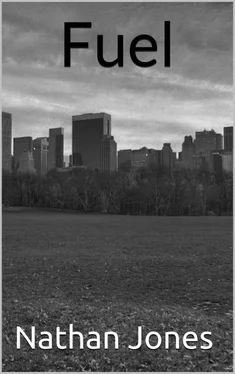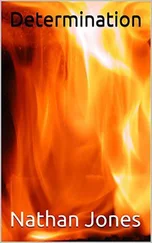This book is dedicated to my brother David, for all his valuable advice and encouragement.
Mere thanks just doesn’t seem like enough.
In most post-apocalyptic fiction I’ve read the events that precede the story tend to be, well, apocalyptical: nuclear holocaust, EMP, major invasions, pandemics, etc. But considering how fragile our existence is, packed into cities completely dependent on everything we need being shipped in at the last possible instant and for the most part no longer possessing the knowledge or skills needed to be self-sufficient, I wanted to explore just how little it would take to bring about a major disaster in our day and age.
And so I wrote Fuel . Anybody who’s driven in extreme conditions (such as blistering desert or intense cold), knows that running out of gas without the things needed to survive even short term can quickly turn an inconvenience into a potentially life or death situation. An extended power outage during the coldest days of winter can be similarly eye opening. It’s a grim prospect to think of what might happen if the entire nation ran out of gas.
The events depicted in this novel are fictional. The characters in this story are also fictional, and any resemblance to anyone living or dead is entirely unintentional. While most locations are real some creative license has been taken in describing them, and the town of Aspen Hill is entirely fictional.
Even a year later Trevor Smith still remembered exactly where he was and what he was doing when he learned Iran and Israel had nuked each other.
He’d been in Biology listening to Professor Adams drone on about phospholipid bilayers when people began shouting out in the halls. He’d even heard a few girls screaming. Only moments later the PA system had blared out the announcement that nukes had been launched in the Middle East and encouraged all classrooms to turn on the news. With some help from his TAs Adams had quickly turned the projector from his presentation to channel 4, with students shouting for him to go to their preferred news channels instead.
It turned out it didn’t matter since they were all showing the same things. Maps of the Middle East with lines showing the origin and paths of the dozen nukes that had been launched between the two countries, frantic newscasters relaying information in front of a background of satellite photos and shaky videos of cities being engulfed in mushroom clouds. The President and other world leaders making announcements forcefully urging calm so the nuclear war wouldn’t spread to the rest of the globe. Dry, completely speculative analyses on what could’ve caused the sudden launching of weapons of mass destruction between the two old enemies.
Classes had been canceled for the rest of the day, which in some ways was almost more difficult than trying to pay attention to school in all the chaos. It meant he had nothing to do but go back to his dorm and follow the news all day, browsing internet sources trying to figure out if someone, anyone, knew more than what the media was telling people. All he’d found were crazy and unfounded theories blaming anyone and everyone. School for the rest of the week had been almost a waste of time since none of the teachers really wanted to teach and none of the students really wanted to learn. Everyone just wanted to talk about what had happened.
It was a terrible disaster that had plunged the US into deep grief. Everyone had talked about it like it was the end of the world, and plenty of people had even cited it as evidence of the impending Biblical apocalypse. But in spite of all that the nation’s day to day life hadn’t changed all that much. Sure, there had been a brief but significant downturn in the stock markets and stocks had been declining ever since, and the US had led the world in sending relief efforts to help the areas around the devastated countries and any survivors who emerged from the wreckage, but the biggest impact had been oil.
The flow of oil had completely halted from the Middle East after that point. The price of gas went up by over two dollars a gallon overnight and there was a minor panic when it looked like the dollar would crash, but the US government managed to stabilize with reserves until they could produce sufficient oil from fracking on US soil, as well as drawing from the Canadian shale oil fields and piping the crude down to the gulf refineries. Some claimed production still wasn’t enough to meet demand and the government was still drawing heavily from reserves in order to maintain consumption at the current rates and avoid a panic. If that was the case no public official never admitted it and the story never touched the mainstream media.
As for the rest of the world, Russia, China, Iran, and a few other countries had already been talking for years about forming a new gold standard to compete with the petrodollar, and spurred by the disaster they finally implemented it, ramping up Russian oil production to be distributed to other nations. Including a European Union that suddenly wasn’t quite as much in lockstep with the US since they had to get their oil from somewhere and the US wasn’t exporting. Needless to say the new Gold Bloc had no interest in selling oil to the US: that reluctance didn’t quite reach the level of an embargo, but only because the US didn’t press the matter.
And so the country around Trev limped along, as the price of oil continued to climb and stock markets continued to plummet. The news was full of new oil drilling ventures that would solve the problem and put things back on track before things could get really bad, and great hope was placed on the vast potential of the untapped fields of northern Canada. In spite of the difficulties nobody considered this a prelude to a major catastrophe or any long term negative effects.
That was the current situation a year after the nukes flew, with the price of gas (and all products produced or shipped to stores using gas) more than doubling during that time. In some places gas edged up over $10 a gallon, although the government did its best to set a hard cap there and worked furiously to keep prices from rising any higher.
It looked as if they would succeed. Even Trev, who didn’t take the news or reassurance of politicians at face value and tried to dig deeper into the truth of the matter, thought that the nation might just pull through and all his efforts to prepare for the disaster he’d seen coming after the nukes flew would be unnecessary after all.
Those illusions were completely gone, now.
It was late at night and his classes started early in the morning, but still he sat up with his roommates watching the explosions on the television screen, captured from every possible angle using every bit of footage the news stations could beg, borrow, or steal. They weren’t fireworks, and they weren’t nuclear explosions. They weren’t bombs being dropped on enemies on foreign soil, or for that matter enemy bombs being dropped on US or allied soil.
The explosions were caused by the entire refinery operation along the Gulf of Mexico going up in flames.
Nobody knew yet whether it was an act of terrorism or sabotage from an enemy power. There was even some confusion about which explosions were from planted charges or boats filled with explosives docking with the refineries, and which were secondary explosions from the tanks of crude oil and refined gasoline igniting. But what even Trev and his roommates could see without being told was that the attacks had been thorough, hitting just about every refinery and storage depot. Even hours later the fires still raged everywhere, including across a large portion of the Gulf of Mexico from ignited oil spilled straight into the water and spreading across the surface to create a firestorm above the dark waters below.
Читать дальше












